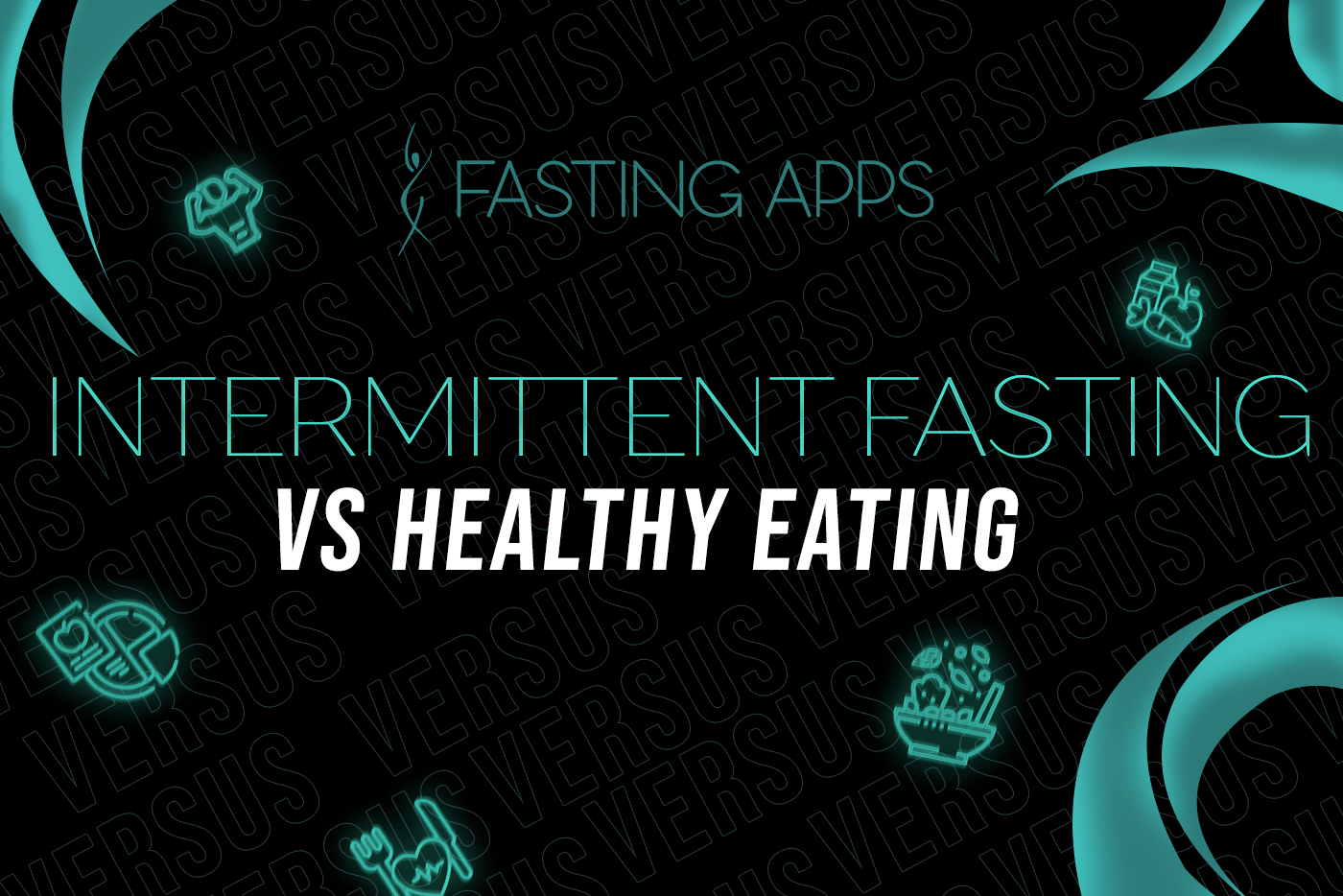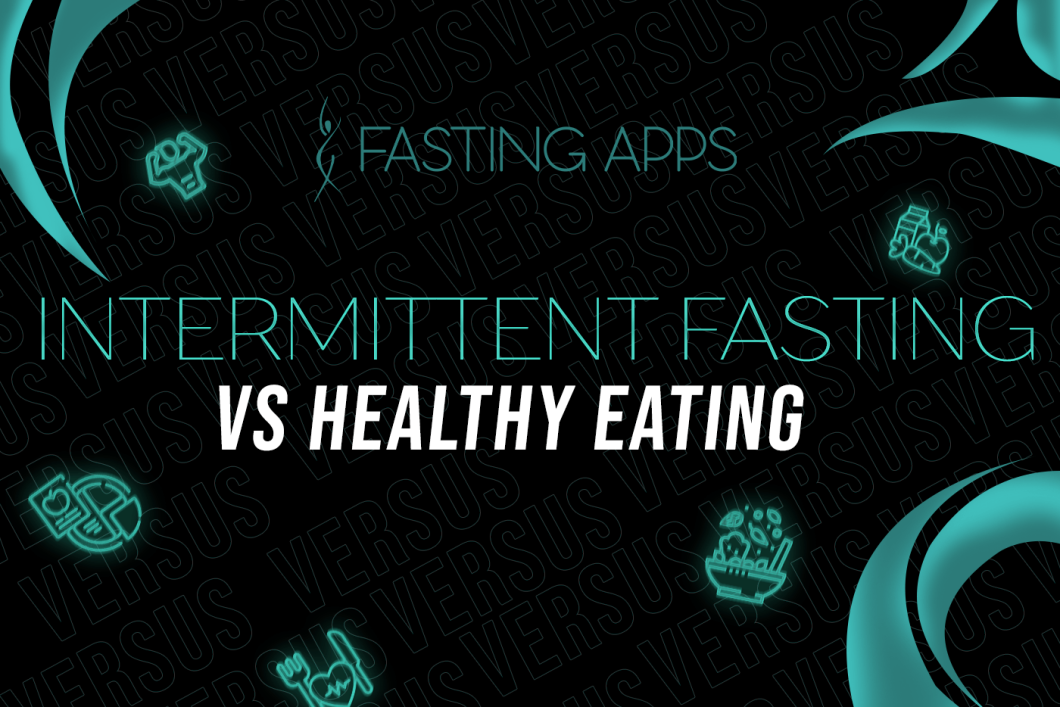Intermittent Fasting vs Healthy Eating
Written by Andrew Brewer. ⚕️Reviewed and fact checked by our medical team.

There’s a lot of crossover when you talk about intermittent fasting and healthy eating, so much so that the lines can become blurred. It is important to note that you can focus on healthy eating without intermittent fasting; however, the same is not true of intermittent fasting. When you are intermittent fasting, you have to focus on healthy eating to get the best results. You don’t technically have to restrict what you eat, but binge eating high-fat, greasy foods will not help you lose weight.
Let’s explore the benefits of both so you can see which will work for you.
Key Takeaways
Intermittent fasting and healthy eating have many overlapping benefits, but healthy eating can stand alone as a method for improving health and nutrition.
Intermittent fasting can trigger autophagy, which helps the body rid itself of damaged cells and can potentially prevent diseases such as cancer and heart disease.
Healthy eating involves focusing on what you eat, including fruits, vegetables, whole grains, and healthy proteins. Intermittent fasting does not restrict what you eat but incorporating healthy eating during eating windows can enhance results.
Intermittent fasting can boost metabolism in the long term, while healthy eating can give temporary boosts in metabolism, especially if you consume high-protein foods.
The choice between intermittent fasting and healthy eating depends on individual goals and preferences, and it's important to find a diet and lifestyle that works for you and supports your overall health and well-being.
Benefits of Intermittent Fasting
When you think about intermittent fasting, you think about when you can eat. By limiting your eating windows, you allow your body to undergo core regenerative processes. The longer fasts can trigger autophagy, which helps your body purge damaged or dying cells. This process is critical in disease prevention, as many corrupted cells can lead to health issues. In addition, you can help reduce your blood sugar levels, cholesterol levels, cortisol, and so much more. Many of these benefits are compounded when you focus on healthy eating, so it’s important to focus not just on when you eat but also on what you eat.
Benefits of Healthy Eating
There are a lot of great foods that are fun to eat. They taste good, but they’re high in sugar, fat, and other components. Indulging every now and then isn’t bad for you, but when you shift your mindset to thinking of food as fuel, you’ll start to look and feel healthier. A lot of the same benefits you get from intermittent fasting, you get from eating healthy. It may help you live longer, promote skin, teeth, and eye health, support muscles, boost immunity, strengthen your bones, lower the risk of heart disease, diabetes, and cancer, promotes digestive health, and more.
What are the Differences?
Let’s explore the key differences between healthy eating and intermittent fasting.
What You Eat
Healthy eating doesn’t restrict when you eat. Instead, it looks at what you eat. When you’re focused on healthy eating, your plate should be filled with fruits, vegetables, whole grains, and healthy proteins - or protein, fiber, and healthy fats.
These foods are also essential components of intermittent fasting because they help you get the nutrients you need to power through your fasts. Theoretically, you can eat what you want on intermittent fasting, but you won’t get results if you do. Instead, integrating a focus on healthy eating during your eating windows will set you up for success. You don’t have to, but you’ll feel better if you do.
Autophagy
Intermittent fasting triggers autophagy. This process starts with calorie restriction and fasting, helping your body shed damaged cells and replace them with healthy new cells. Once your body consistency engages in autophagy, you’ll look and feel younger and healthier. It’s thought that this can impact longevity, helping prevent some life-threatening diseases like cancer, heart disease, and more.
Metabolism
If you’re looking to boost your metabolism in the long term, then look no further than intermittent fasting. When you change how and when you eat, your body’s core processes adjust to accommodate. Not only can it improve your metabolism, but it can also change how your body processes sugar, protein, and more. Healthy eating can give you temporary boosts in your metabolism, especially if you eat high-protein foods.
How to Choose?
Healthy eating is a core part of intermittent fasting, so you don’t have to choose between the two if you don’t want to! However, if you don’t want to fast, you can focus on healthy eating to get weight loss results. You just won’t get some of the additional healing benefits.
Our #1 Recommendation: DoFasting
It's easily one of the best intermittent fasting apps that offers plenty of features for anyone!
Use coupon code: 10app to get an extra 10% off all memberships.
FAQ
What is healthy eating?
Healthy eating refers to consuming a well-balanced diet that includes a variety of nutrient-dense foods, such as fruits, vegetables, whole grains, lean proteins, and healthy fats.
What are the benefits of intermittent fasting?
Intermittent fasting has been shown to promote weight loss, improve metabolic health, increase longevity, and reduce the risk of chronic diseases.
What are the benefits of healthy eating?
Healthy eating can help maintain a healthy weight, reduce the risk of chronic diseases, and promote overall health and well-being.
Can intermittent fasting and healthy eating be combined?
Yes, intermittent fasting can be combined with healthy eating to maximize its benefits. Eating a well-balanced diet during eating periods can provide essential nutrients while still allowing the body to reap the benefits of intermittent fasting.
Is intermittent fasting safe for everyone?
Intermittent fasting may not be safe for everyone, particularly those with a history of disordered eating or certain medical conditions. It is important to consult a healthcare professional before starting an intermittent fasting regimen.
Is healthy eating expensive?
Eating a healthy diet can be affordable. Planning meals, buying in-season produce, and buying in bulk can help reduce costs.
Can intermittent fasting and healthy eating be sustained long-term?
Both intermittent fasting and healthy eating can be sustainable long-term if approached in a balanced and sustainable way. It is important to find an eating pattern that works for your lifestyle and preferences.
Which is better, intermittent fasting or healthy eating?
Both intermittent fasting and healthy eating have their benefits and can be effective for improving health. The best approach will depend on individual preferences and goals.

